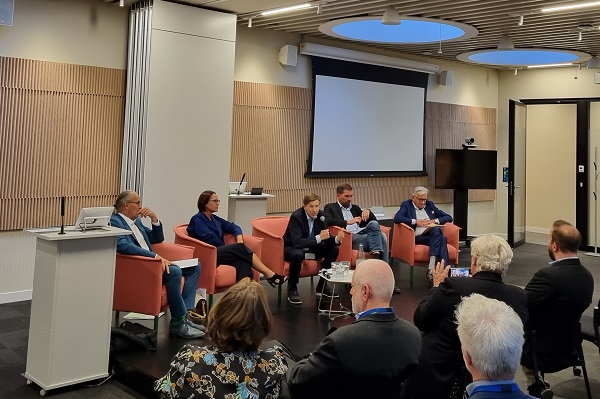 (L-R) Claude Turmes (Greens); Yuriko Backes (DP); David Arendt (moderator); Yves Cruchten (LSAP); Laurent Mosar (CSV);
Credit: Jazmin Campbell/Chronicle.lu
(L-R) Claude Turmes (Greens); Yuriko Backes (DP); David Arendt (moderator); Yves Cruchten (LSAP); Laurent Mosar (CSV);
Credit: Jazmin Campbell/Chronicle.lu
On the evening of Wednesday 20 September 2023, the American Chamber of Commerce in Luxembourg (AMCHAM) teamed up with Amazon in Luxembourg-Kirchberg to host an English-language elections-related event with a focus on finance and the economy.
This event brought together representatives of Luxembourg's four largest political parties ahead of the legislative (national) elections, which are taking place on Sunday 8 October 2023.
As AMCHAM Chairman and CEO Paul Schonenberg explained, the objective of this event was twofold: to give audience members an opportunity to ask major political parties their thoughts on issues which are important to Luxembourg's business community and to tell them what the business community wants. The event also served as a platform to announce the launch of AMCHAM's new government relations committee, chaired by Amazon's Italo di Lorenzo.
The event took the form of a panel discussion, moderated by David Arendt, followed by a Q&A session and a networking cocktail. The panellists were: Yuriko Backes, Luxembourg's Minister of Finance, speaking on behalf of the Democratic Party (DP); Claude Turmes, Luxembourg's Minister for Energy and Spatial Planning, representing the Greens (Déi Gréng); Yves Cruchten, MP and President of the Luxembourg Socialist Workers' Party's (LSAP) parliamentary group; Laurent Mosar, MP and Luxembourg City municipal council member, representing the Christian Social People's Party (CSV).
The hot topics on this occasion were namely tax measures and the business environment, with a focus on how Luxembourg can attract and retain talent and remain competitive.
Regarding taxation, Laurent Mosar highlighted CSV's wish to reduce corporate tax, which currently stands at around 25% in the Grand Duchy, bringing it closer to the OECD average. The panellists representing the coalition parties (DP-LSAP-Greens) recalled that the corporate tax had already been lowered a number of times in recent years. Yuriko Backes noted that there was room for improvement but rejected claims that Luxembourg was no longer attractive to businesses. Claude Turmes said it would be important to prioritise investment in mobility, schools and affordable housing before considering cutting taxes. Yves Cruchten added that he did not see this as an "urgent measure" but stressed that the next government should focus on lowering taxes for low- to mid-income earners.
The panellists generally agreed on the importance of Luxembourg's wage indexation system and that of social dialogue. They also agreed on the need to reduce the administrative burden on companies, particularly through digitalisation. There was also consensus on the need for Luxembourg to retain its AAA credit rating in order to remain attractive. Nevertheless, the hot topic of taxation cropped up again, with Claude Turmes reiterating the need to prioritise certain public investments rather than promising tax reductions; Yuriko Backes countered that raising taxes could mean losing out on business and talent.
There was disagreement over LSAP's promotion of a 38-hour work week (without a reduction in pay). Whilst Yves Cruchten noted the benefits, backed up by various studies, in terms of work-life balance and productivity, Laurent Mosar said that a reduction in work time in the current context (struggle to find talent) would be "irresponsible". Instead, he suggested looking at a better organisation of working time. Yuriko Backes added that reduced hours might make sense in countries where unemployment is high but this was not the case in Luxembourg. She suggested instead looking at more flexible work models. For his part, Claude Turmes agreed on the need for a better work-life balance, particularly for parents. He did not reject the idea of a reduction in working hours but suggested the topic be discussed in a sector-specific way.
Yves Cruchten advocated the introduction of a wealth tax, saying the highest earners should "pay their fair share", but not an inheritance tax, i.e. for direct descendants. Both Yuriko Backes and Laurent Mosar rejected the idea of either a wealth or inheritance tax in this context.
In the lively Q&A that followed, audience members expressed their concerns about Luxembourg seeming to lose attractiveness in recent years and asked several questions, for example about rising unemployment among qualified young people and the potential value of increasing connections between academic institutions like the University of Luxembourg and industry players. One proposed solution to the talent shortage question was to look at producing more talent in the Grand Duchy itself.









